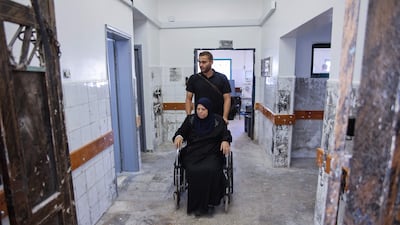Live updates: Follow the latest news on Israel-Gaza
Work is under way to rehabilitate several areas of Gaza’s biggest hospital, officials and patients told The National, to meet the urgent need for medical aid in the besieged enclave after severe damage to medical facilities in eight months of relentless Israeli bombardment
Efforts are being carried out to rehabilitate parts of Al Shifa Hospital but the difficulty in obtaining materials due to border closures and Israeli restrictions on the entry of construction supplies into Gaza are slowing down the process.
“What is happening at Al Shifa Hospital is not a restoration process but an attempt to rehabilitate some rooms and floors under the request and pressure of residents and patients,” Mutasim Salah, a member of the Health Emergency Committee in the Gaza Strip told The National.
Mr Salah said the area under rehabilitation is the unit providing care for patients with kidney failure who have not had access to medical attention in weeks.
In April, the Israeli army conducted a military operation at the medical complex for 14 days, which resulted in dozens of deaths, injuries, hundreds of arrests and extensive destruction in the hospital and its vicinity.
Mass graves were later discovered there when the Israeli army withdrew.
The kidney and maternity wards, mortuary refrigerators, cancer centre and outpatient clinic building were all destroyed during the military operation.
“Work at Al Shifa Hospital is ongoing to try to provide life-saving services, and it cannot return to its pre-war state until the opportunity arises, large companies return to work and the crossings are reopened to bring in all the necessary equipment,” Mr Salah said.
The Israeli army is preventing the entry of medical supplies into northern Gaza despite pressure by numerous international aid groups, said the official.
“Most of the rebuilding cost comes from donors and volunteers who offer their efforts for free. Some equipment and tools were obtained from buildings and government hospitals previously destroyed by the occupation, which we tried to rehabilitate,” Mr Salah said.
Despite limited access to the tools needed, Mr Salah and his team are concerned they will not be able to restore the hospital's emergency department because of the extensive damage, especially as the war continues to rage on.
So far, only one room has managed to operate in the kidney department at Al Shifa hospital, Salam Marouf, the head of the government media office in Gaza, told The National.
“This room provides dialysis services to around 1,200 patients in northern Gaza, specifically with six units currently operational. Patients have started coming in for treatment after being deprived of it for weeks due to the systematic destruction,” he said.
“The delay in providing appropriate treatments, especially for those with chronic illnesses, has significantly impacted their overall health, as reported by the Ministry of Health and international organisations.” Mr Marouf said.
The room is operational due to the efforts of Gaza Health Ministry staff, he said, adding that they worked tirelessly for days to quickly restore and repair equipment.
“Work is currently ongoing to open other departments in the hospital in collaboration with local entities and volunteers. However, all efforts by the Ministry of Health, whether in northern or southern Gaza, cannot meet the population's needs amid the ongoing Israeli extermination war,” he said.
In order to have a genuine restoration process the ministry needs “substantial and appropriate resources to revive hospitals in both northern and southern Gaza equally”, he said.
New hope for kidney failure patients
Ahmad Islim, 32, a kidney failure patient, told The National that the reopening of the kidney department had given him “a new life” after he had lost hope of being able to undergo dialysis again.
“I was diagnosed with kidney failure at the age of 17 and since then, my dialysis has been regular. I used to visit the dialysis department twice a week. I don’t recall ever missing a session over all these years, except during this war,” Mr Islim said.

He believes that he has a second chance at life following the endless work by the medical team and volunteers.
“Now other kidney failure patients from northern Gaza and myself are able to receive treatment and dialysis after weeks of interruption, hoping our health would gradually improve,” he said.
Ameen Abu Hani, a resident of Al Shati Refugee Camp near Al Shifa Hospital, said the rehabilitation of the complex provided hope to people in Gaza that life could go back to normal despite the severe damage.
“For weeks, we have seen many people, including doctors, technicians attempting to repair Al Shifa Hospital and bring it back to life,” Mr Abu Hani told The National, adding that civilians never expected the hospital to start functioning again.
The return of life and operations to Al Shifa Hospital means “if we fall ill or get injured in the war, we have a place to go for treatment and to receive our right to medical care,” he said.
“We all hope Al Shifa Hospital can fully reopen all its clinics and departments very soon so we can receive the treatment we need when we need it.”


